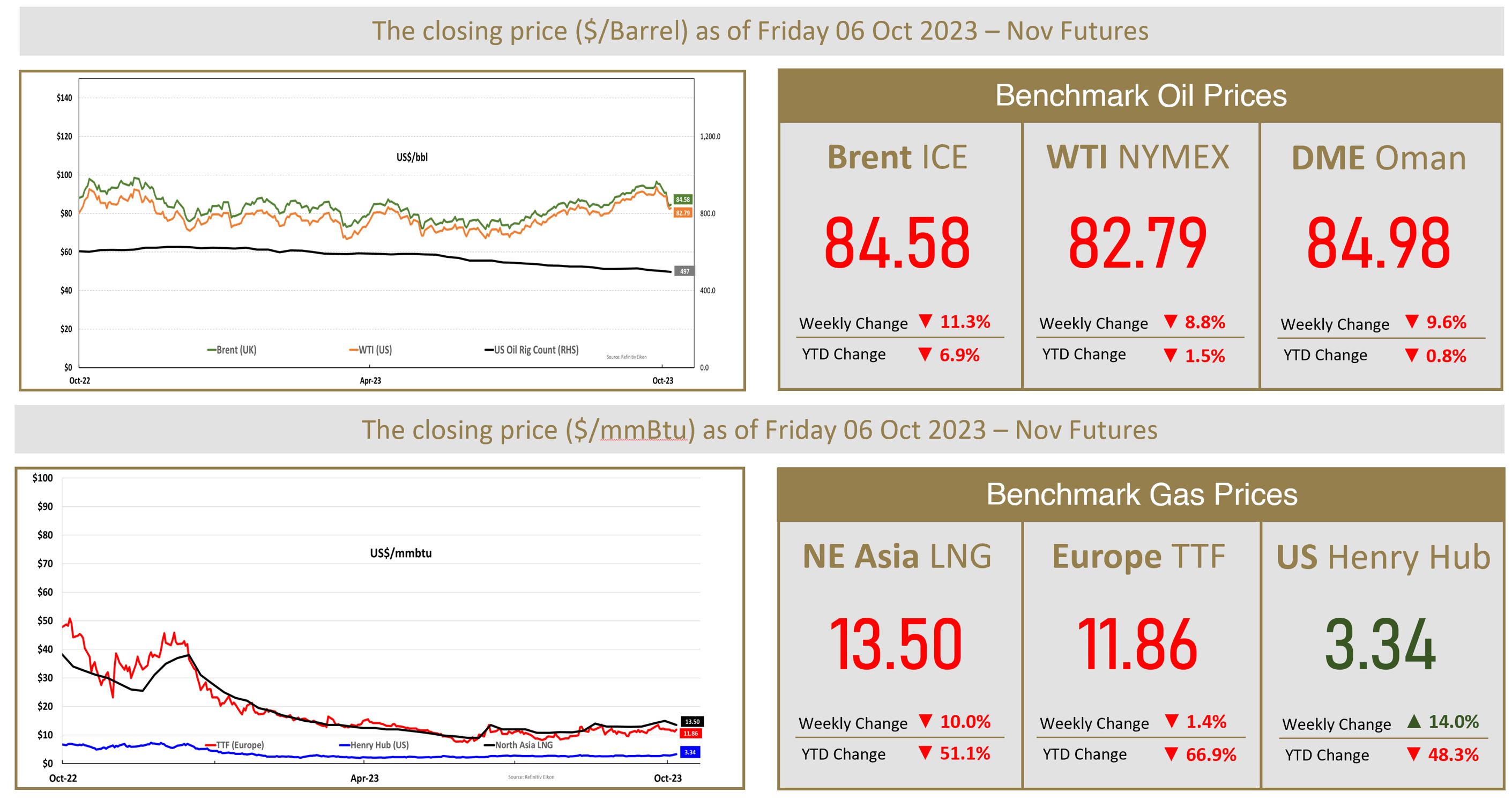
403
Sorry!!
Error! We're sorry, but the page you were looking for doesn't exist.
Oil Prices Rise, but Post Biggest Weekly Decline Since March
(MENAFN- The Al-Attiyah Foundation) Oil prices rose on Friday but posted their steepest weekly losses since March, after another partial lifting of Russia's fuel export ban compounded demand fears due to macroeconomic headwinds. Russia announced it had lifted its ban on diesel exports for supplies delivered to ports by pipeline. However, companies still must sell at least 50% of their diesel production to the domestic market. On Friday, Brent futures settled up 51 cents at $84.58 per barrel. U.S. WTI crude futures rose 48 cents to close at $82.79. For the week, Brent posted a decline of about 11% and WTI recorded an over 8% drop, on worries that persistently high interest rates will slow global growth and hammer fuel demand, even if supplies are depressed by Saudi Arabia and Russia, who said they will continue supply cuts to year end. In the U.S., the number of jobs rose by 336,000 in September according to Labor Department statistics, far exceeding economists' forecasts of a 170,000 rise. The sentiment of the statistics is mixed for oil prices. A robust U.S. economy could buoy sentiment for near-term oil demand, but conversely the statistics resulted in a stronger U.S. dollar and increased bets on another interest rate hike in 2023.
Asia Spot Prices Retreats From 7-Month High on Tepid Demand
Asian spot liquefied natural gas (LNG) prices retreated from a seven-month high as demand remained muted due to warmer weather and as market players did not envisage production losses from the possible return of strikes in Australia. The average LNG price for November delivery into north-east Asia fell by 10% to $13.5 per million British thermal units (mmBtu) from $15 the previous week, industry sources estimated. Efforts to finalise a pact that ended strikes at Chevron's two Australian LNG plants stumbled on Thursday, when workers voted to restart stoppages after unions accused the U.S. energy major of backing out on commitments. In Europe, gas prices at the Dutch TTF hub hit new lows this week, mainly supported by high stock levels in Europe that reached 96.47% full. The Dutch November contract settled at $11.86 per mmBtu. U.S. natural gas futures jumped about 5% on Friday and 14% for the week to an eight-month high as lower output, rising exports, cooler weather, and rising heating demand. If strikes at Chevron's plants reduce the amount of LNG Australia exports, global gas prices will rise, including in the U.S., which is on track to become the world's biggest LNG exporter in 2023.
By: The Al-Attiyah Foundation.
Asia Spot Prices Retreats From 7-Month High on Tepid Demand
Asian spot liquefied natural gas (LNG) prices retreated from a seven-month high as demand remained muted due to warmer weather and as market players did not envisage production losses from the possible return of strikes in Australia. The average LNG price for November delivery into north-east Asia fell by 10% to $13.5 per million British thermal units (mmBtu) from $15 the previous week, industry sources estimated. Efforts to finalise a pact that ended strikes at Chevron's two Australian LNG plants stumbled on Thursday, when workers voted to restart stoppages after unions accused the U.S. energy major of backing out on commitments. In Europe, gas prices at the Dutch TTF hub hit new lows this week, mainly supported by high stock levels in Europe that reached 96.47% full. The Dutch November contract settled at $11.86 per mmBtu. U.S. natural gas futures jumped about 5% on Friday and 14% for the week to an eight-month high as lower output, rising exports, cooler weather, and rising heating demand. If strikes at Chevron's plants reduce the amount of LNG Australia exports, global gas prices will rise, including in the U.S., which is on track to become the world's biggest LNG exporter in 2023.
By: The Al-Attiyah Foundation.

Legal Disclaimer:
MENAFN provides the
information “as is” without warranty of any kind. We do not accept
any responsibility or liability for the accuracy, content, images,
videos, licenses, completeness, legality, or reliability of the information
contained in this article. If you have any complaints or copyright
issues related to this article, kindly contact the provider above.


















Comments
No comment